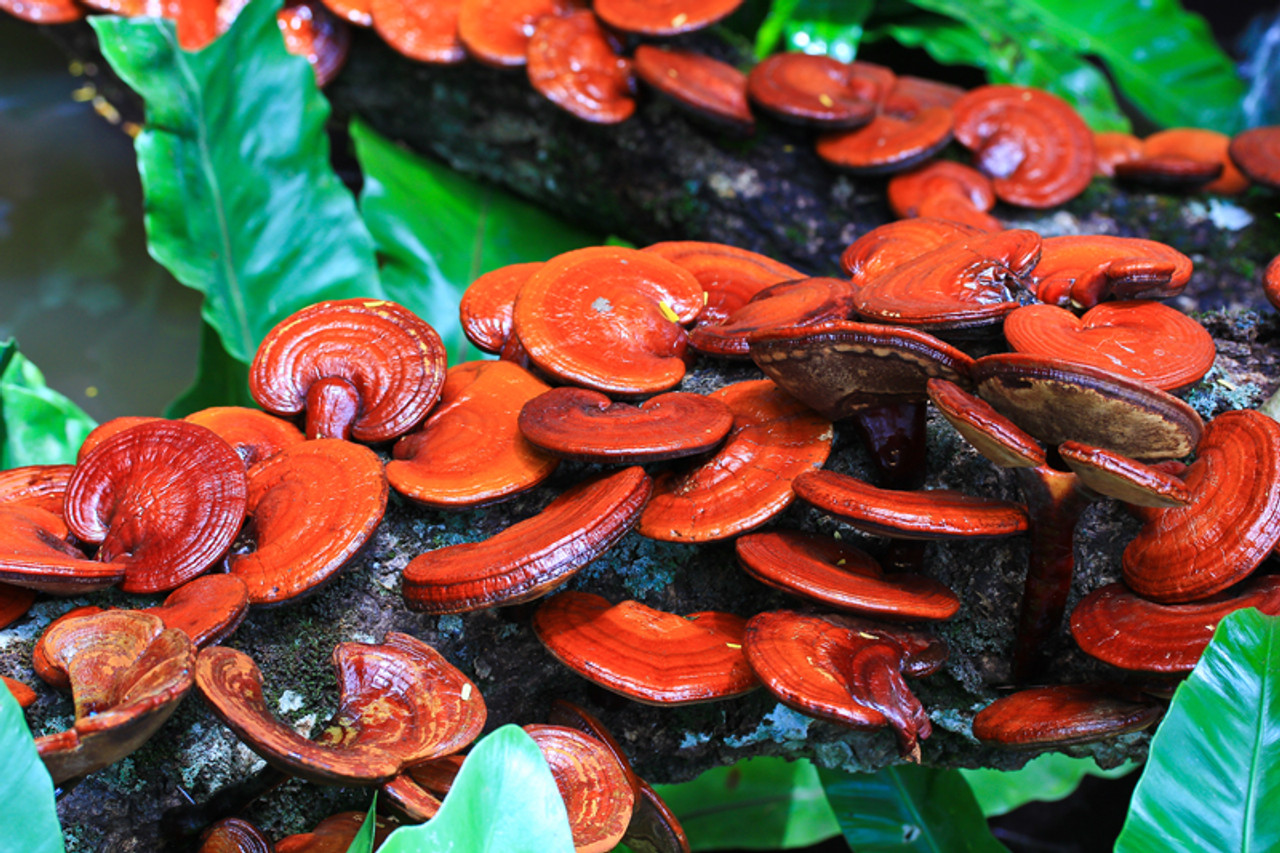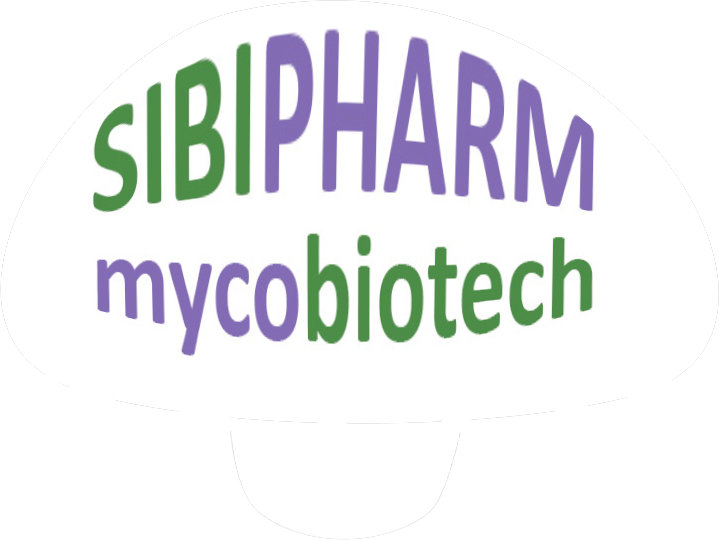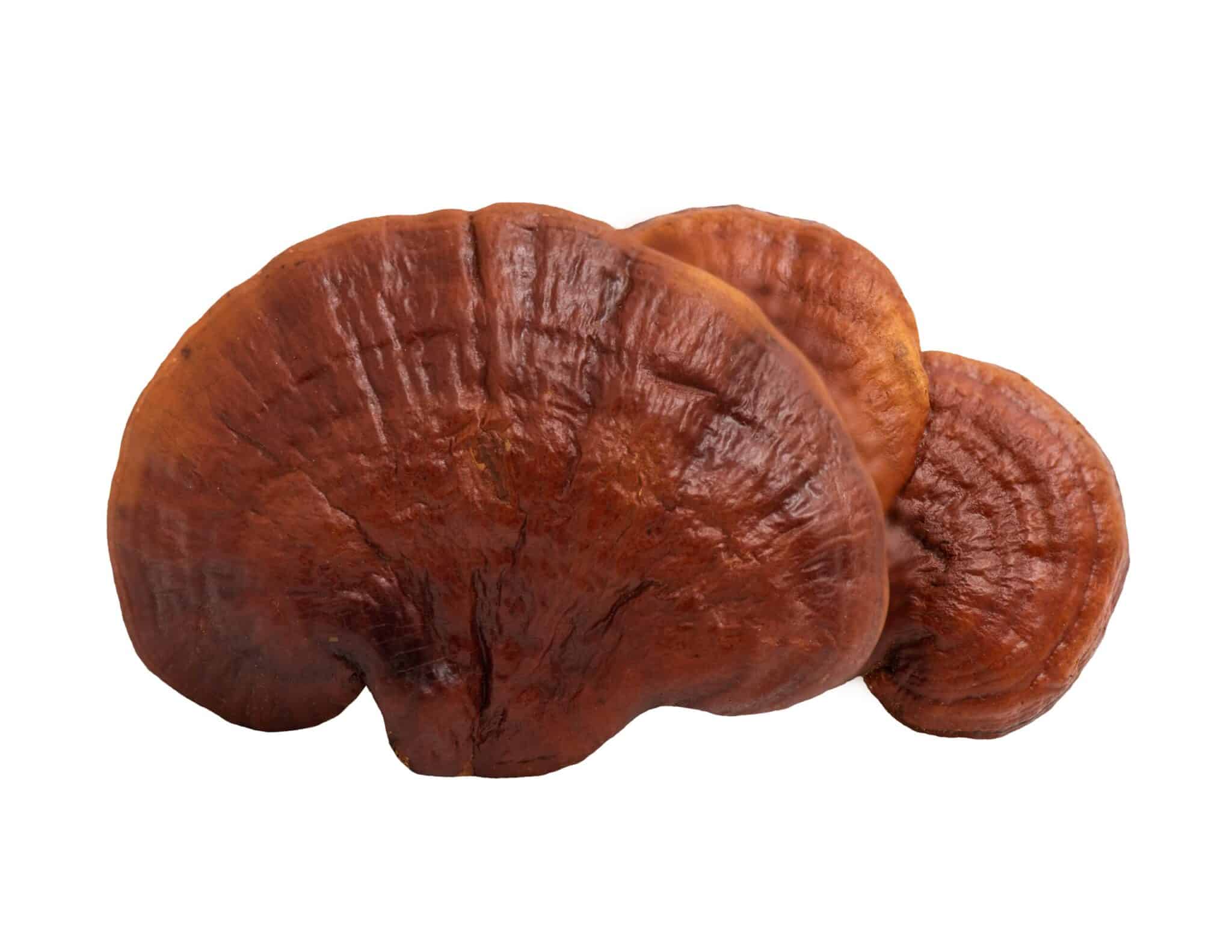Latin name: Ganoderma lucidum
The main areas of application of the Reishi mushroom are:
- Support of the immune system.
- Improvement of cardiovascular function.
- Liver protection and detoxification.
- Antioxidant effect.
- Anti-inflammatory effect.
- Support of the nervous system.
- Acceleration of tissue regeneration.
- Regulation of blood sugar levels.
- Antitumor activity.
- Fight against fatigue and stress.
Description of the Reishi mushroom
Reishi (Ganoderma lucidum) is a large perennial mushroom with a characteristic varnish-like surface and bright coloring, varying from red-brown to dark orange. Its fruiting body has a zonal structure and can reach 20 cm in diameter. The mushroom is found in the form of fan-shaped caps on trees or their roots.
Reishi grows in temperate and subtropical forests, where it parasitizes on deciduous trees such as oak and maple. It is often found on rotting wood, especially in humid conditions. The main regions of distribution are China, Japan, Korea and some parts of Europe.
Special farms have been created for the cultivation of Reishi, where the fungus is grown on wood substrates such as sawdust, stumps or logs. In natural conditions, this fungus is less common than other species, so its cultivation has acquired an industrial scale.

The species composition of the fungus varies, but most representatives of the genus Ganoderma have similar biochemical properties. The appearance of the fungus may differ slightly depending on the region of growth and the type of tree on which it grows.
History of the use of Reishi in medicine
The Reishi mushroom has been known in traditional East Asian medicine for over two thousand years. In Chinese medical practice, it is called the “mushroom of immortality” for its ability to strengthen health and increase life expectancy. In ancient China, it was considered so valuable that it was only available to the imperial family.
In ancient Japan, Reishi was used by samurai to increase their endurance and strengthen the body before battles. It was also used in meditation and spiritual practices, believing that the mushroom helps to achieve inner harmony.
In Traditional Chinese Medicine (TCM), Reishi was used to treat a wide range of diseases, including bronchitis, asthma, heart and liver disease, as well as to strengthen the body in general. It is believed that Reishi helps restore vitality (qi), enhancing the body’s ability to self-heal.
In the mid-20th century, Western medicine turned its attention to the medicinal properties of Reishi. Research has shown that the active components of the mushroom do have a positive effect on health. In the 1970s, the first attempts to cultivate Reishi in laboratory conditions began, which gave impetus to the development of biochemical research.
Today, Reishi is actively used in both TCM and Western herbal medicine. Its extracts are included in biologically active supplements, creams and other preparations aimed at strengthening the immune system and improving the functioning of internal organs.
Active substances in the Reishi mushroom
More than 400 different biologically active compounds have been found in Reishi. The main components include polysaccharides, triterpenoids, peptides, sterols, as well as vitamins and minerals.
Polysaccharides, such as beta-glucans, play a key role in immunomodulation. They stimulate the activity of macrophages and natural killers, enhancing the immune response and increasing the body’s defense against viral and bacterial infections.
Triterpenoids (ganoderma acid) have anti-inflammatory and antioxidant effects. These compounds help reduce the level of free radicals, reducing oxidative stress in cells and preventing DNA damage.
Adenosine is one of the active components involved in the regulation of the cardiovascular system. It improves blood circulation, reduces blood viscosity and prevents blood clots.
Ganoderic alcohols have an antimicrobial effect, helping to fight infectious agents. They also exhibit hepatoprotective properties, protecting the liver from damage.
Sterols play an important role in cholesterol metabolism, which helps maintain cardiovascular health.
Reishi also contains B vitamins such as riboflavin, thiamine and niacin, which are involved in energy metabolism processes and support the health of the nervous system.
Minerals such as potassium, magnesium, iron and calcium help normalize metabolic processes, maintain bone health and improve muscle function.
Some studies indicate the presence of organic germanium in Reishi, which may explain its antihypoxic properties – the ability to improve oxygen transport in cells and tissues.
Therapeutic effect of Reishi mushroom for biohackers
For biohackers, Reishi is of particular interest due to its unique adaptogenic properties. It helps the body adapt to stressful conditions, improving the ability to withstand both physical and mental stress. Regular consumption of Reishi extract can significantly increase resistance to fatigue and speed up recovery after intense training. The mushroom helps optimize the immune system, which is especially important for biohackers who strive to maintain a high level of physical activity and mental concentration.
The immunomodulatory effect of Reishi allows the body to better protect itself from viral and bacterial infections. The polysaccharides of the mushroom activate important components of the immune system, including macrophages and lymphocytes, which is especially important in conditions of constant stress and increased loads.
The antioxidant properties of the mushroom help fight oxidative stress, which is one of the main causes of cell aging and the development of chronic diseases. Reducing free radicals in cells improves skin condition, increases overall tone and slows down the aging process.
An important effect for biohackers is the ability of Reishi to improve the quality of sleep. Ganodermic acids reduce cortisol levels, helping the body relax and fall asleep faster. This is especially useful for those who suffer from insomnia or have an irregular sleep schedule. Reishi also helps improve cognitive functions. Its active components stimulate the work of neurons, improve memory and concentration. This makes the mushroom indispensable for biohackers seeking to increase their productivity and intellectual activity.
In addition, Reishi supports the health of the cardiovascular system, normalizing cholesterol and blood pressure levels. This reduces the risk of atherosclerosis and other heart diseases that can occur with high physical activity.
The mushroom has the ability to regulate blood sugar levels, which is especially important for biohackers monitoring their metabolism and energy balance. Reducing glucose levels helps maintain stable energy throughout the day, avoiding sudden declines and fatigue.
For biohackers who are actively involved in sports, an important property of Reishi is its ability to accelerate tissue regeneration.
Disclaimer:
The information provided in this article is for educational and informational purposes only. It is not intended as a substitute for professional medical advice, diagnosis, or treatment. Never disregard professional medical opinion and consult with a specialist.
Scientific articles:
- Ganoderma Lucidum (Reishi Mushroom) and cancer.
Unlu A, Nayir E, Kirca O, Ozdogan M.
https://pubmed.ncbi.nlm.nih.gov/27685898/
- Ganoderma lucidum (Reishi mushroom) for cancer treatment.
Jin X, Ruiz Beguerie J, Sze DM, Chan GC.
https://pubmed.ncbi.nlm.nih.gov/27045603/
- Characterizing novel anti-oncogenic triterpenoids from ganoderma.
Li X, Xie Y, Yang BB.
https://pubmed.ncbi.nlm.nih.gov/28402700/
- The beneficial effects of Ganoderma lucidum on cardiovascular and metabolic disease risk.
Chan SW, Tomlinson B, Chan P, Lam CWK.
https://pubmed.ncbi.nlm.nih.gov/34465259/
- Ganoderma lucidum-Derived Meroterpenoids Show Anti-Inflammatory Activity In Vitro.
Liu YY, Cai D, Tang XP, Cheng YX.






